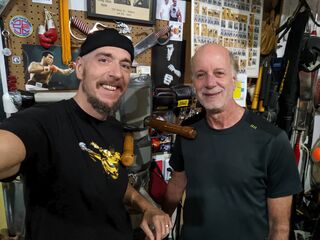Education
Life and Learning Require an Empty Cup
An open and receptive mind is fundamental to acquiring new knowledge.
Posted December 11, 2022 Reviewed by Jessica Schrader
Key points
- Learning requires acknowledging ignorance while ignoring the failure that comes with the process of eventual success.
- To truly engage, we have to clear our minds of thoughts about what we think we already know.
- Emptying the cup of your mind is an important image of a growth and learning mindset.
Whether a tea cup or the human brain, you can't add to a container that is already full. I recently had a very interesting set of experiences. They involve martial arts, as a lot of my experiences tend to, and combine both what I previously knew and something actually new.
Everybody was kung fu fighting
During the pandemic, I reconnected with an old friend. Way back when, we got to know each other and connected on many levels but one of the main ones was a shared set of experiences in martial arts; he in Wing Chun kung fu and Jeet Kune Do and me in Okinawan and Japanese karate and Ryukyu Kobujutsu weapons.
We got to thinking that, given how everyone was using Zoom and other meeting platforms to do all kinds of things, maybe we can get together and share some knowledge. I always wanted to learn Wing Chun and he was interested in learning the Okinawan Bo staff. Subsequently, we met each other online every two weeks and shared videos and instruction and training tips. But what we weren't able to share was the physical experience of application of the new knowledge we were both acquiring from each other.
Recently we did connect and found ourselves in the same physical space for a few days of training together. It was quite enlightening. My friend and I have about 90 years of martial arts training between the two of us. We have a lot to share with each other and a lot of experience in the fighting arts over long careers in martial arts learning and teaching.
We also initially struggled mightily when we got together.

Stuck on sticking hands
My friend would teach me Wing Chun’s chi sao and the required soft touch for sticking hands and the subtleties of how to move in Wing chun. I understood the basic principles from my other experiences but transforming them into this new way of moving and training was extremely difficult. When we worked together with weapons, we would be using the same principles again as we had just been doing with chi sao but my friend struggled trying to apply those same ideas with a big wooden stick.
We laughed a lot at the irony of what we were experiencing and how we were both going through exactly the same issues but with different drills and methodologies. Despite that, or maybe because of it, we did have a lot of fun and we were quite successful at sharing information. This is largely down to a couple of things. Firstly neither of us have big egos about trying to be the martial arts master lording it over the other one. In other words, we didn't get in our own way but instead we got out of each other's way. This is just as one should always do in martial arts—get out of the way but put yourself in a good position for safety and defense.
Especially crucial to our successful experiences was that both of us were open to learning new things. There’s a martial arts adage that comes from the story "A Cup of Tea" in the book Zen Flesh, Zen Bones about a Zen master Nan-in (1868-1912) and a visiting academic professor wanting to learn. The visitor comes to the master but rather than trying out what the master is sharing, instead talks endlessly about what he already knows. Eventually the Zen master serves tea and when he pours into the cup of the visitor he just keeps on pouring even after the cup is full. The startled visitor tells the master that he must stop pouring because all the tea is spilling over and not going into the cup anymore. The Zen master tells this visitor this is exactly like their own interactions. Unless the visitor empties the cup of his mind, the Zen master is unable to share anything with him.
We, Chi, and Bruce Lee
When authentically attempting to learn something, it’s critical to empty your cup so that new information can be put into that empty vessel. This adage applied very well to my friend and me. Especially since Bruce Lee made this saying quite famous by paraphrasing it as, “Empty your cup so that it may be filled; become devoid to gain totality,” while acting as "Li Tsung" in the 1971 ABC TV show Longstreet. Since my friend also trains in Bruce Lee’s Jeet Kune Do, this is quite relevant.
While it was the physical nature of martial arts that my friend and I were working on, I think the lesson here can be applied to anything and everything. The main lesson I took away from this was don't have a big ego, trust your past experiences to help but keep them in the background, and empty your cup so that new knowledge can enter.
This concept also applies to emptying your cup of negativity that may be there from past failings or that accrues while you are learning something new. Learning requires acknowledging ignorance while ignoring the failure that comes with the process of eventual success. If you combine the philosophical approach of emptying your cup with a respectful attitude, you can achieve a lot of things. Whether that's in the physical practice of martial arts, the philosophical application of training to your life, or to any other experiences you might have on your life's journey.
© E. Paul Zehr (2022).




